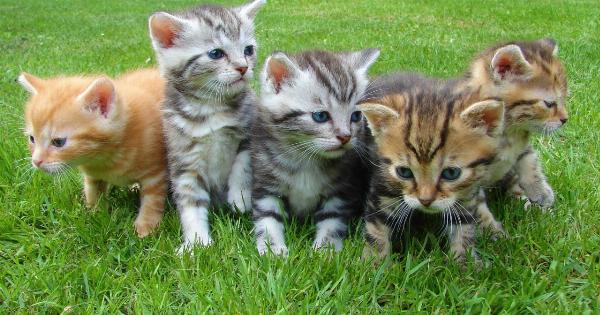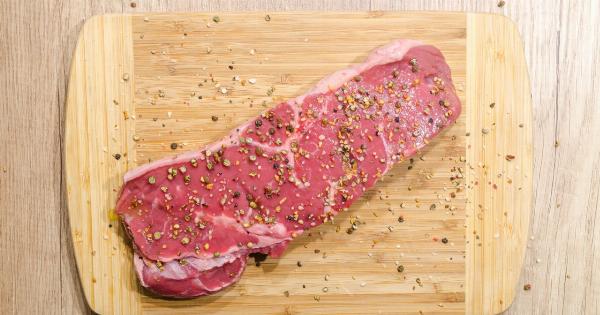Many cat owners have witnessed their furry friends munching on grass in the backyard or even inside the house. This peculiar behavior might leave you wondering why your cat is so keen on devouring blades of grass.
While it may seem odd, it turns out that there are several reasons behind this seemingly strange habit. In this article, we will delve into the various explanations for why cats feel the urge to eat grass and explore the potential benefits and risks associated with this behavior.
1. Natural Instincts
Cats, despite being domesticated, still retain many of their wild instincts. One such instinct is the consumption of grass. In the wild, cats would often consume small portions of grass as part of their diet.
This grass ingestion helps them expel indigestible materials, such as fur or bones, from their digestive system. Additionally, grass acts as a natural laxative, aiding in the passage of hairballs that may accumulate in the cat’s stomach.
2. Nutritional Needs
It is believed that cats may eat grass to fulfill certain nutritional needs. Grass contains certain vitamins, minerals, and fiber that can be beneficial for their health.
By instinctively ingesting grass, cats could be trying to supplement their diet with these essential nutrients. However, it is important to note that grass alone cannot fulfill all of a cat’s nutritional requirements. A well-balanced diet designed specifically for their needs is still crucial.
3. Boredom or Behavioral Enrichment
Some cats may eat grass simply out of boredom or as a form of behavioral enrichment. Grass provides them with an opportunity to engage in a different activity, simulating their senses and providing mental stimulation.
It might also serve as a form of play and entertainment for them. If your indoor cat shows excessive interest in eating grass, it could be an indication that they need more environmental enrichment and interactive toys to keep them mentally and physically engaged.
4. Digestive Aid
When cats eat grass, it can help induce vomiting, which can be beneficial if they have ingested something toxic or have an upset stomach. Grass acts as a natural irritant to the cat’s digestive system, causing them to vomit.
This expulsion can help clear their stomach of any unwanted substances or hairballs, promoting overall digestive health. However, if your cat is vomiting excessively or shows signs of distress after eating grass, it is essential to consult a veterinarian, as there may be an underlying medical condition.
5. Sensory Stimulation
Chewing on grass provides sensory stimulation for cats. The texture and taste of grass may be enjoyable or interesting for them. Cats have taste buds designed to sense bitter flavors, which grass often has.
This uniqueness may add an element of excitement to their daily routine and provide them with a sensory experience they find appealing.
6. Healing Properties
Some experts suggest that grass may have healing properties for cats. Certain types of grass, such as wheatgrass, are known to contain antioxidants, vitamins, and enzymes that could potentially provide health benefits.
These benefits include improved digestion, reduced inflammation, and boosted immune system function. However, more research is needed to fully understand the extent of these therapeutic properties and their effects on cats.
7. The Hunt for Prey
Cats are natural predators, and their instinct to hunt remains strong, even in domesticated cats. Eating grass can be viewed as a way to mimic the sensation of hunting and capturing prey.
The act of stalking, biting, and tearing at the grass blades may trigger their predatory instincts, giving them a sense of satisfaction and fulfillment.
8. Avoiding Hairballs
Hairballs are a common issue for cats, especially those with long hair or excessive grooming habits. Ingested hair can accumulate in their stomachs, leading to the formation of hairballs.
By consuming grass, cats may be attempting to facilitate the passage of hairballs through their digestive system, reducing the likelihood of discomfort or blockage.
9. Environmental Factors
The environment, both indoor and outdoor, can influence a cat’s desire to eat grass. Indoor cats who lack access to fresh grass and vegetation may develop a stronger craving for it.
The lack of stimulation from nature can increase their curiosity and desire to explore different textures and tastes. In contrast, outdoor cats may have more opportunities to encounter grass and plants, satisfying their natural instincts naturally.
10. Unidentified Reasons
While there are several known explanations for why cats eat grass, some aspects of this behavior remain mysterious. Cats have individual preferences and habits that might be unique to them.
Your cat’s desire to eat grass could be driven by factors yet to be fully understood, making it challenging to pinpoint the exact reason behind their behavior.
Understanding the Risks and Precautions
While grass-eating behavior is generally considered normal for cats, it is essential for pet owners to be mindful of certain risks and precautions associated with this habit.
Firstly, not all grass is safe for cats. Some grasses may be treated with harmful chemicals, such as pesticides or fertilizers, which can be toxic if ingested.
It is crucial to ensure that the grass your cat has access to is free from any potentially harmful substances.
Secondly, plants other than grass might be toxic to cats. If your cat has access to a garden or outdoor area, it is important to identify which plants are safe and which should be off-limits.
Some common plants, like lilies and azaleas, can be highly toxic and pose a significant threat to cats if consumed.
Moreover, excessive grass consumption and subsequent vomiting can lead to other issues. Frequent vomiting may result in dehydration, electrolyte imbalances, or damage to the esophagus.
If your cat consistently shows signs of distress or excessive vomiting after eating grass, it is advisable to consult a veterinarian.
Conclusion
Although the desire to eat grass may seem peculiar, it is a relatively common behavior amongst cats. Whether driven by natural instincts, nutritional needs, or simply boredom, this behavior is generally considered safe and normal.
However, it is important to be mindful of any potential risks or medical concerns associated with grass consumption. By providing a safe and cat-friendly environment, ensuring a balanced diet, and being aware of any harmful substances, you can promote your cat’s well-being and satisfy their grass-eating instincts.






























